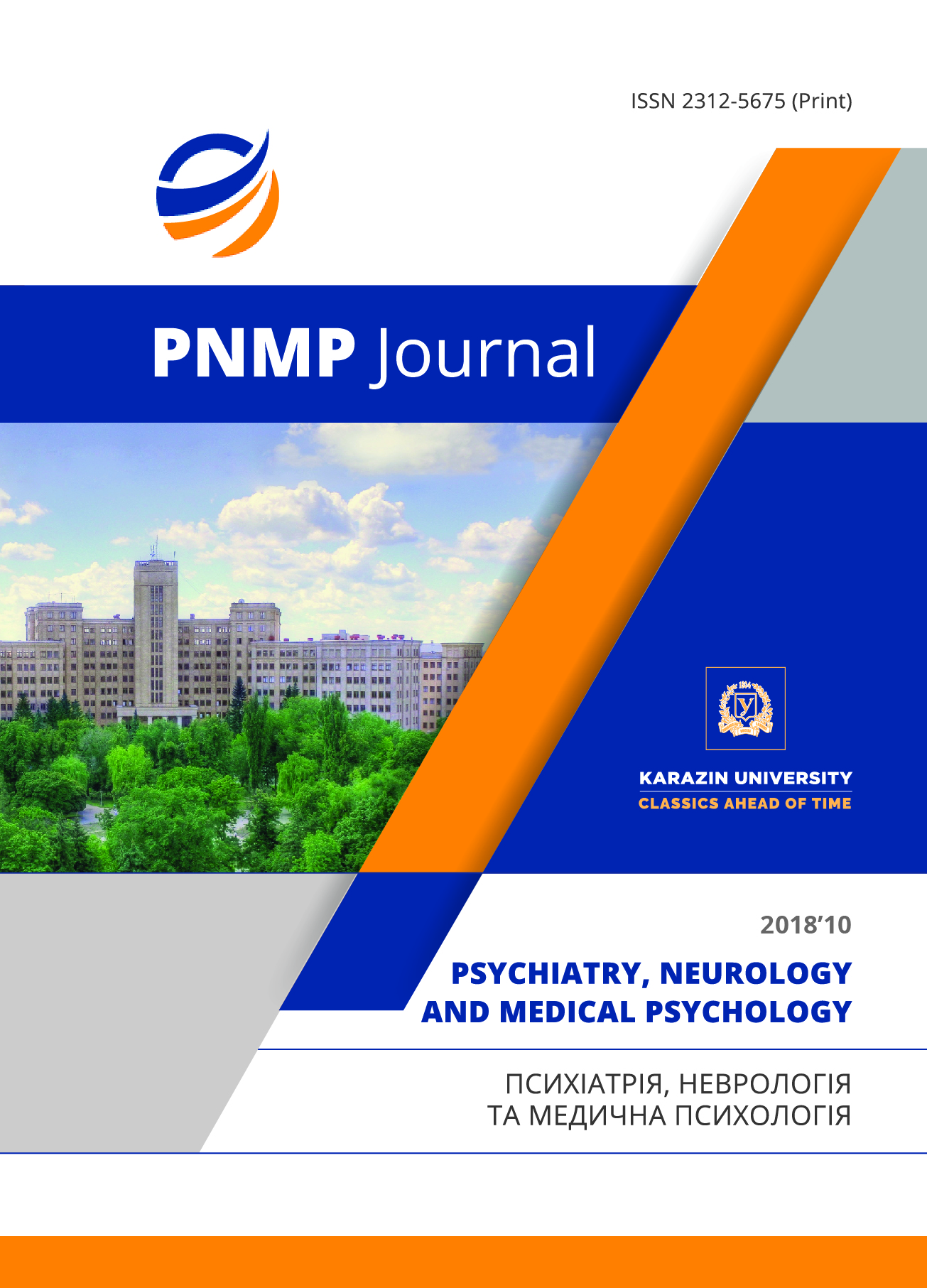Ефективність методів психоневрологічної корекції у пацієнтів з порушеннями когнітивної та психоемоційної сфер на тлі тяжкої черепно-мозкової травми у процесі відновлення свідомості
Abstract
Psychoemotional and cognitive impairments are an integral part of the recovery of consciousness of patients with severe brain lesions. The adequacy and timeliness of psychо-correcting methods in the process of restoring higher mental functions play an important role. The paper presents the results of rehabilitation treatment of 220 patients with post-comatose long-term impairment of consciousness as a result of traumatic brain injury at the stages of reintegration of consciousness, of which - 138 at the stage of confusion, 72 - at the stage dismnesic syndrome. Neuropsychiatric rehabilitation was carried out using the following techniques: cognitive rehabilitation, cognitive-behavioral therapy (psychological rehabilitation with psychotherapeutic techniques); neuro-sensory and neurodynamic correction (psychostimulation); psychopharmacotherapy. As a result of neuropsychiatric rehabilitation, all patients showed positive dynamics of consciousness of varying severity, and in 46 of them, consciousness regained completely, and only 14 patients stopped at the stage of dysmnesic syndrome, but at the same time became as socially integrated as possible. When analyzing the effectiveness of the methods, it was shown that in the process of neurorehabilitation the neuropsychiatric correction should have an integrated approach, and the methods cover the influence on the patient’s recovery process from the reintegration of basic reflexes to the correction of hemispheric interaction, kinesthetic praxis and cognitive cognitive sphere. At each of the stages of restoration of consciousness, it is important to use adequate psychopharmacocorrection depending on the clinical manifestations and dynamics of psycho emotional reactions. Thus, as a result of the study, the importance of an integrated approach to psychoneurological correction at all stages of the neurorehabilitation process and the use of adequate psycho-pharmacotherapy at each of the stages of recovery of consciousness, depending on the clinical manifestations, major syndromes and the dynamics of psychoemotional reactions, was confirmed. The dependence of the speed and quality of the recovery of consciousness on the peculiarities of mental processes has been revealed.
Downloads
References
Быкова В.И., Бойко А.Ю., Лукьянов В.И., Харьковский А.Н. Теория и практика восстановлени поврежденного мозга. Клинический антропоцентризм.// Интерактивная наука. №12, 2017. С. 16-22.
Быкова В.И. Диалог с пациентом при угнетении сознания после глубоких повреждений головного мозга / В.И. Быкова, В.И. Лукьянов, Е.В. Фуфаева // Консультативная психология и психотерапия. – М., 2015. – Т.23. - №3. – С. 9-31.
Голберг Э. Парадокс мудрости. Научное опровержение «старческого слабоумия». – М.: Поколение, 2007. – С. 374.
Доброхотова Т.А. Нейропсихиатрия. – М.: Издательство БИНОМ. – 2006. – Сю 165-176.
Зайцев О.С. Нейрореаниматология. Выход из комы (терапия посткоматозных состояний) / О.С. Зайцев, С.В. Царенко. – М.: Литасс, 2012. – С. 120.
Зайцев О.С. Психопатология тяжелой черепно-мозговой травмы. – М.: МЕДпресс-информ, 2011. – С. 336.
Закрепина А.В. Педагогические технологии в комплексной реабилитации детей с тяжелой черепно-мозговой травмой. - М.: Парадигма, 2012. – С. 302.
Захаров В.В. "Нейропсихологические тесты. Необходимость и возможность применения" - Consilium medicum. Т.№13, №2, с.82-90.
Клинические рекомендации "Нейропсихологическая диагностика и нейропсихологическая реабилитация пациентов, находящихся в сниженном состоянии сознания после повреждения головного мозга"./ Москва, - 2014, С.20-21, 25-27.
Кондратьева Е.А. Вегетативное состояние (Этиология, патогенез, диагностика и лечение): Монография / Е.А. Кондратьева, И.В. Яковенко. – СПб.: ФГБУ «РНХИ им. Проф. А.А. Поленова» Минздрава России, 2014. – С. 361.
Курс лекцій з діагностики та корекції порушень розвитку у дітей на основі новітніх brain connection methods./Київ, - 2018.
Маслоу А. Мотивация и личность. – СПб.: Евразия, 1999. – С. 77-105
Матеріали лекцій Joseph E. Maio, PH.D. "Evidence-based treatment of PTSD". - Київ, 2017
Назарова М.А., Пирадов М.А. "Зеркальная терапия в нейрореабилитации". - ФБГНУ "Научный центр неврологии", Москва.- Регулярные выпуски «РМЖ» №22 от 15.10.2014, с. 1563
Ревонсуо Антти. Психология сознания // Перевод: А. Стативка, З.С. Замчук. Серия «Мастера психологии». – СПб.: Питер, 2013. – С. – 336.
Семенова Ж.Б. Этапы оказания помощи детям с черепно-мозговой травмой. Задачи нейрохирурга // Неврология и нейрохирургия детского возраста. – 2012. – №2-3. – С.105-112.
"Уніфікований клінічний протокол "Депресія (легкий, помірний, тяжкий депресивний епізоди без соматичного синдрому або з соматиним синдромом, рекурентний депресивний розлад, дистимія" затверджений наказом МОЗ України №1003 від 25.12.2014р.
Фуфадзе Е.В. Значение фактора произвольности на разных этапах восстановления сознания у детей с тяжелой черепно-мозговой травмой. Нейропсихологический подход // Вопросы нейрохирургии имени Н.Н. Бурденко, 78. – 2014. - №1. – С. 50-56.
Таран І. В., Валюшко Ю. Ерготерапія, як сучасний напрямок фізичної реабілітації хворих із травмами й захворюваннями нервової системи / Таран І. В., Валюшко Ю. // Теоретичні та методичні проблеми фізичної реабілітації : матеріали VІ Всеукр. наук.-метод. конф. – Херсон, 2016. – С. 292 – 298.
A.Jean Ayres, Ph.D. "Sensory integration and the child" / L.A.,- 2005.- пер. "Теревинф"-2009
Andreas Rothgangel, Susy Braun, Lucde Witte, Anna Beurskens, Rob Smeets "Mirror Therapy: Practical protocol for patients with phantom limb pain" / March, 2015. Р. 5-16.
Carr J., Sheferd R.A. Motor Learning Programme for Stroke. – 2-nd ed. – Heinemann, 1982.
Rothgangel A.S., Braun S.M. "Mirror Therapy: Practical protocol for stroke rehabilitation.", 2013

